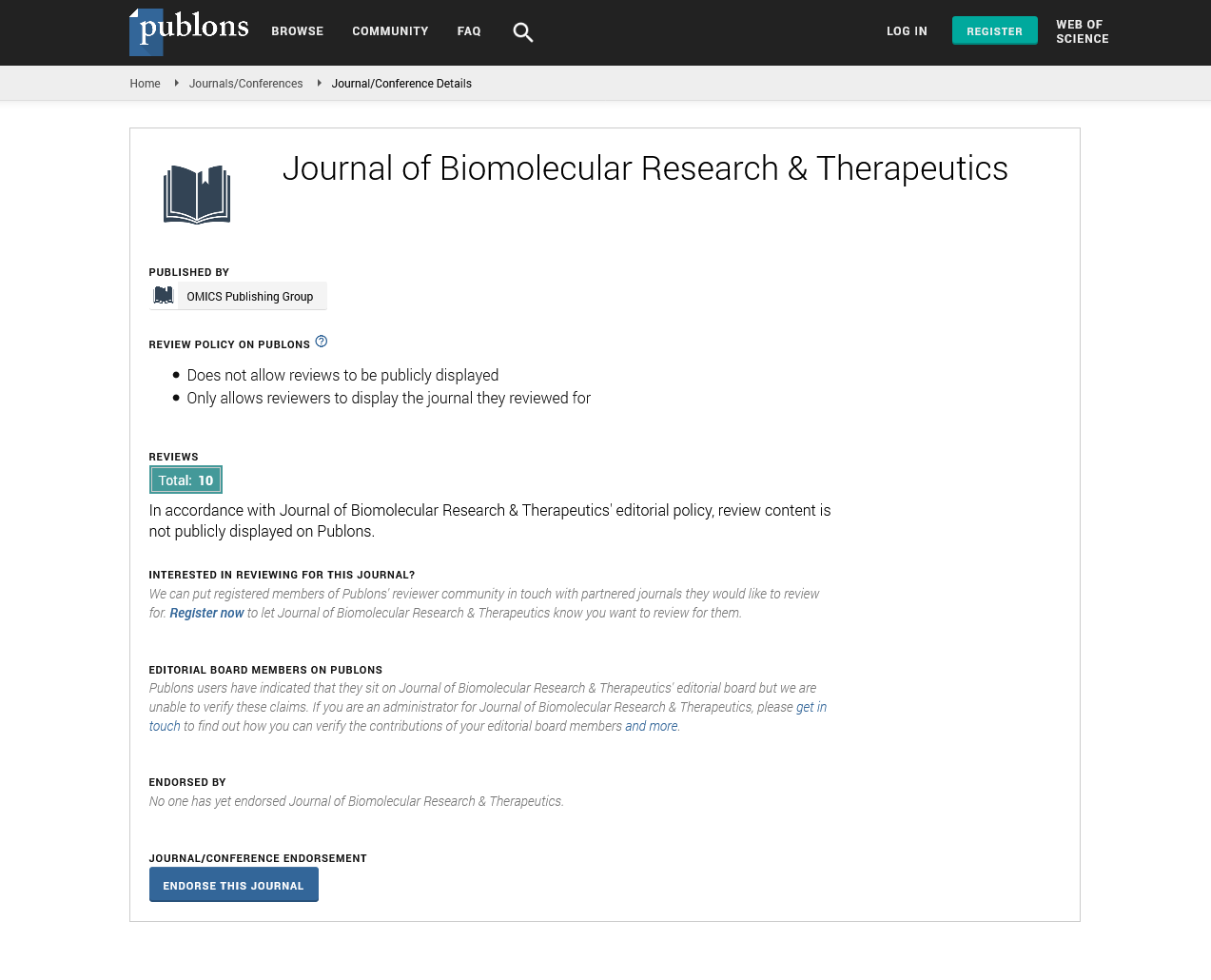Indexed In
- Open J Gate
- Genamics JournalSeek
- ResearchBible
- Electronic Journals Library
- RefSeek
- Hamdard University
- EBSCO A-Z
- OCLC- WorldCat
- SWB online catalog
- Virtual Library of Biology (vifabio)
- Publons
- Euro Pub
- Google Scholar
Useful Links
Share This Page
Journal Flyer

Open Access Journals
- Agri and Aquaculture
- Biochemistry
- Bioinformatics & Systems Biology
- Business & Management
- Chemistry
- Clinical Sciences
- Engineering
- Food & Nutrition
- General Science
- Genetics & Molecular Biology
- Immunology & Microbiology
- Medical Sciences
- Neuroscience & Psychology
- Nursing & Health Care
- Pharmaceutical Sciences
Opinion Article - (2024) Volume 13, Issue 1
AI Integration in Bioreactor Control: A Change of Opinion in Biotherapeutic Manufacturing
Joe Mills*Received: 29-Jan-2024, Manuscript No. BOM-24-25392; Editor assigned: 31-Jan-2024, Pre QC No. BOM-24-25392 (PQ); Reviewed: 14-Feb-2024, QC No. BOM-24-25392; Revised: 21-Feb-2024, Manuscript No. BOM-24-25392 (R); Published: 28-Feb-2024, DOI: 10.35248/2167-7956.23.13.368
Description
In the search for biotechnology, the significance of bioreactors cannot be overstated. These vessels serve as the energy of biotherapeutic production, where cells are cultivated and directed to yield vital drugs. However, the efficacy and efficiency of bioreactors depend heavily on control systems, which dictate the environment in which these cells grow. Recent advances in bioreactor control technology are representing a new era in biotherapeutic production, potential enhanced yields, improved product quality, and accelerated development timelines.
Bioreactor control systems have been limited in their ability to exactly regulate critical parameters such as temperature, pH, dissolved oxygen levels, and nutrient concentrations. Fluctuations in these variables can extremely impact cell growth and product formation, leading to inconsistencies and reduced yields. Moreover, the manual intervention required to maintain optimal conditions is labor-intensive and level to human error, further complicating the manufacturing process.
Advanced bioreactor control technologies, driven by innovation and powered by automation. These systems hold innovative sensors, complicated algorithms, and real-time data analytics to arrange symmetry of biological processes with unique precision. By continuously monitoring and adjusting multiple parameters simultaneously, these smart bioreactors create an ideal environment for cell growth and product formation, optimizing productivity while minimizing variability.
One of the most potential advancements in bioreactor control is the integration of machine learning and Artificial Intelligence (AI). These technologies enable bioprocess engineers to develop predictive models that anticipate the dynamic behavior of cells and optimize control strategies accordingly. By analyzing vast datasets generated during bioreactor operations, AI algorithms can identify small patterns and correlations that human operators might overlook, leading to stronger and adaptive control schemes.
Furthermore, the emergence of single-use bioreactors has revolutionized the region of biopharmaceutical manufacturing. These disposable vessels eliminate the need for time-consuming cleaning and sterilization procedures, minimizing the risk of cross-contamination and reducing downtime between batches. Combined with advanced control systems, single-use bioreactors offer unparalleled flexibility and scalability, allowing manufacturers to rapidly respond to changing market demands and accelerate the development of new therapies.
In addition to enhancing productivity and efficiency, advanced bioreactor control technologies play an essential role in ensuring the quality and safety of biotherapeutic products. By maintaining tight control over process parameters, these systems minimize the risk of product impurities, ensuring compliance with stringent regulatory standards. Furthermore, real-time monitoring capabilities enable early detection of deviations from the desired operating conditions, allowing for timely interventions to prevent process failures and product losses.
The impact of these advancements extends far beyond the area of the laboratory, build for the future of healthcare and biopharmaceutical innovation. With the ability to produce biotherapeutic products more reliably, cost-effectively, and sustainably, advanced bioreactor control technologies hold the potential of expanding access to vital treatments for patients around the world. Moreover, by streamlining the development and manufacturing process, these technologies empower researchers and manufacturers to bring new therapies to market more quickly, addressing critical medical needs and driving continued progress in the fight against disease.
However, despite the tremendous potential of advanced bioreactor control technologies, challenges remain on the path to broad adoption. High upfront costs, technical complexity, and regulatory hurdles pose significant barriers for many organizations, particularly smaller biotech companies and academic research institutions. Furthermore, the rapid pace of innovation in this field necessitates ongoing investment in research and development to stay ahead of the curve and unlock the full potential of these technologies.
In conclusion, advances in bioreactor control are transforming the region of biotherapeutic production, carrying in a new era of innovation and progress. By controlling the power of automation, artificial intelligence, and single-use technologies, biopharmaceutical manufacturers can achieve new levels of productivity, efficiency, and quality. As these technologies continue to evolve and developed, they trust to revolutionize the way we develop, manufacture, and deliver vital treatments to patients in need.
Citation: Mills J (2024) Advancements in Precision Gene Expression Control: Transcription Factor-Based Inducible Systems. J Biol Res Ther. 13:368.
Copyright: © 2024 Mills J. This is an open access article distributed under the terms of the Creative Commons Attribution License, which permits unrestricted use, distribution, and reproduction in any medium, provided the original author and source are credited.

